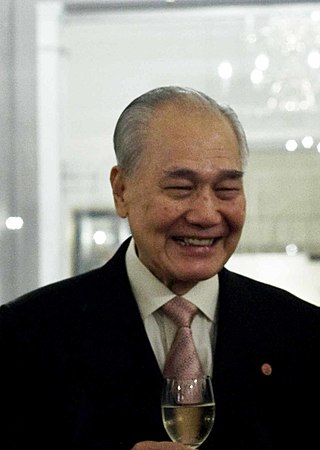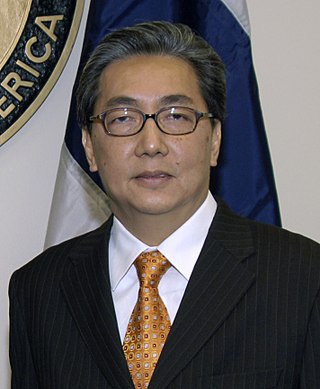
Thaksin Shinawatra is a Thai businessman, politician and visiting professor. He served in the Thai Police from 1973 to 1987, and was the Prime Minister of Thailand from 2001 to 2006.

Anand Panyarachun was Thailand's Prime Minister twice: once in 1991–1992 and again during the latter half of 1992. He was effective in initiating economic and political reforms, one of which was the drafting of Thailand's "Peoples' Constitution", which was promulgated in 1997 and abrogated in 2006. Anand received a Ramon Magsaysay Award for Government Service in 1997.
The 2006 sale of the Shinawatra family's share of Shin Corporation (ShinCorp) to Temasek Holdings caused great controversy in Thailand. The sale was in response to long-standing criticisms that the Shinawatra family's holdings created a conflict of interest for Thai Prime Minister Thaksin Shinawatra. Criticisms of the sale focused on the insistence by Thaksin and a compliant government that the transaction was exempt from capital gains tax, the fact that the Thai company was sold to a Singaporean company, and the fact that the Thai law regarding foreign investments in the telecom sector had been amended just prior to the sale. Thaksin's sale also impacted holdings, among other parties, of the Crown Property Bureau that had an investment in Siam Commercial Bank that held ShinCorp stock.

Somkid Jatusripitak is a Thai economist, business theorist, and politician.

Internal Security Operations Command or ISOC is the political arm of the Royal Thai Armed Forces. It was responsible for the suppression of leftist groups from the 1960s to the 1980s. During this period it was implicated in atrocities against activists and civilians. ISOC was implicated in a plot to assassinate Prime Minister Thaksin Shinawatra.

Muangthai Raisabdah is a Thai political talk show hosted by Sondhi Limthongkul and Sarocha Pornudomsak. The show is Sondhi's personal mouthpiece, and up to 2004 it praised Premier Thaksin Shinawatra. Later, when relations between the two soured, it became one of the Premier's most vocal critics. In September 2005, the show was cancelled by its broadcaster, MCOT, after Sondhi allegedly made on-air comments disrespectful to King Bhumibol Adulyadej. Sondhi started independently broadcasting his show via satellite and internet, turning tapings into rallies against the government. In February 2006, Sondhi co-founded the People's Alliance for Democracy and the show was incorporated into the PAD's anti-Thaksin rallies.
Allegations of corruption during the development of Suvarnabhumi Airport, the newest international airport serving Bangkok, Thailand, have been made since the project's inception. These allegations started in the 1970s, when land for the airport was purchased during the dictatorship of Thanom Kittikachorn, and extended to the government of Thaksin Shinawatra, during which most of the construction occurred.

Sonthi Boonyaratglin is a Thai former Commander-in-Chief of the Royal Thai Army and former head of the Council for National Security, the military junta that ruled the kingdom, of Iranian descent. He was the first Muslim in charge of the army of the mostly Buddhist country. On 19 September 2006, he became the de facto head of government of Thailand after overthrowing the elected government in a coup d'état. After retiring from the Army in 2007, he became Deputy Prime Minister, in charge of national security.

The 2006 Thai coup d'état took place on 19 September 2006, when the Royal Thai Army staged a coup d'état against the elected caretaker government of Prime Minister Thaksin Shinawatra. The coup d'état, which was Thailand's first non-constitutional change of government in fifteen years since the 1991 Thai coup d'état, followed a year-long political crisis involving Thaksin, his allies, and political opponents and occurred less than a month before nationwide House elections were scheduled to be held. It has been widely reported in Thailand and elsewhere that General Prem Tinsulanonda, key person in military-monarchy nexus, Chairman of the Privy Council, was the mastermind of the coup. The military cancelled the scheduled 15 October elections, abrogated the 1997 constitution, dissolved parliament and constitutional court, banned protests and all political activities, suppressed and censored the media, declared martial law nationwide, and arrested cabinet members.
The Council for National Security or CNS, formerly known as the Council for Democratic Reform or CDR, was the military junta that governed Thailand after staging a coup d'état against Prime Minister Thaksin Shinawatra.

Mom Rajawongse Pridiyathorn Devakula is a Thai economist. He was the Governor of the Bank of Thailand from 2001 to 2006. Following the 2006 Thai coup d'état he served as minister of finance and deputy prime minister in the interim civilian government led by Prime Minister Surayud Chulanont. Following the 2014 Thai coup d'état he was appointed as a deputy prime minister in the first military appointed cabinet under General Prayut Chan-o-cha. Two days earlier he had resigned from his position as chairman of the board of Post Publishing PLC, the publisher of the Bangkok Post, Thailand's leading English-language newspaper.
The 2006 Thai interim civilian government is the Thai provisional civilian government headed by Interim Prime Minister General Surayud Chulanont. It was appointed on 1 October 2006 by the Council for National Security, the initial post-coup interim military government led by General Sonthi Boonyaratglin, which had overthrown the government of Thaksin Shinawatra in a coup on 19 September 2006. The interim government operated under an interim constitution, promulgated that same day.

Surayud Chulanont is a Thai politician. He was the Prime Minister of Thailand and head of Thailand's interim government between 2006 and 2008. He is a former supreme commander of the Royal Thai Army and is currently Privy Councilor to King Vajiralongkorn.
Khun Ying Potjaman Damapong, formerly Potjaman Shinawatra, née Soypetpotjaman Damapong is the ex-wife of former Thai Prime Minister Thaksin Shinawatra.

The 2006 Bangkok bombings occurred on 31 December 2006 and 1 January 2007, during New Year's Eve festivities in Bangkok, Thailand. Four explosions went off almost simultaneously in different parts of the city at around 18:00 local time, followed by several more explosions within the next 90 minutes. Two explosions also occurred after midnight. In total, eight explosions were reported during the night.
General Saprang Kalayanamitr is a retired officer of the Royal Thai Army, Assistant Secretary-General of the Council for National Security (CNS), Commander of the junta's 14,000-man anti-protest force, chairman of the Board of Directors of Airports of Thailand (AoT), and also Chairman of the Boards of TOT and CAT Telecom, two major Thai state-owned telecommunication companies.

Police General Sereepisuth Temeeyaves is the leader of Thai Liberal Party, a Party List member of the House of Representatives of Thailand, and the chairman of the National Assemby's Committee on Corruption Prevention and Suppression.

TOT Public Company Limited is a Thai state-owned telecommunications company. Originally established in 1954 and corporatized in 2002, TOT used to be known as the Telephone Organization of Thailand and TOT Corporation Public Company Limited. TOT's main line of business is fixed line telephony, although it has several other businesses, including mobile telephony. Since 2021, TOT PCL become National Telecom Public Company Limited after merger with CAT Telecom.

CAT Telecom Public Company Limited is the state-owned company that runs Thailand’s international telecommunications infrastructure, including its international gateways, satellite, and submarine cable networks connections. Since 2021 CAT Telecom became the National Telecom Public Company Limited after merging with TOT Public Company Limited.
People's Television (PTV) was a Thai satellite television station. It was established by former executives of the Thai Rak Thai party after the 2006 Thailand military coup overthrew the Thai Rak Thai-led government. It launched despite warnings from the Council for National Security, the military junta that seized power. PTV executives insisted that if ASTV could operate, then so could PTV.














